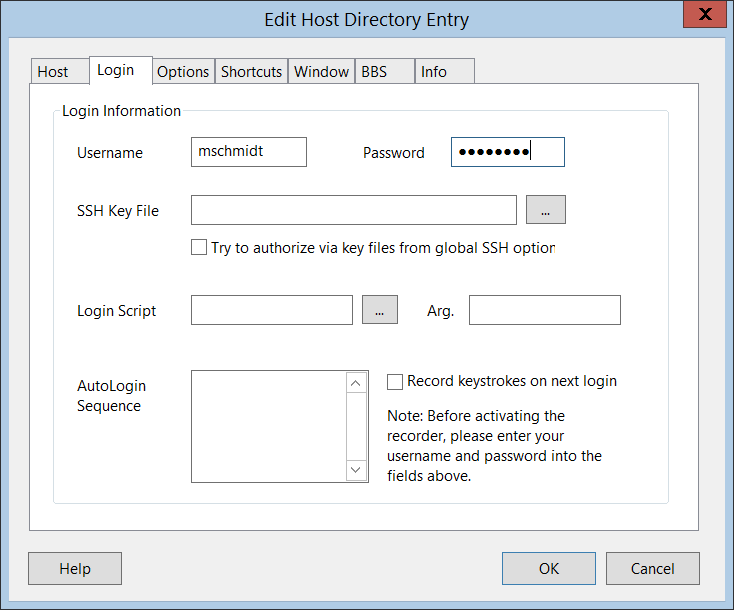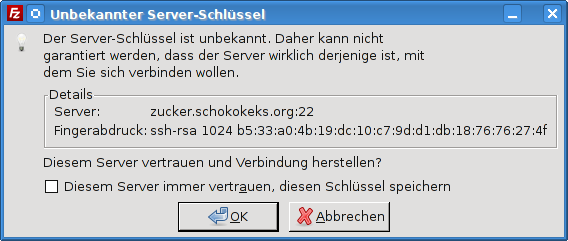
- FILEZILLA SSH CREATE KEY EXAMPLE HOW TO
- FILEZILLA SSH CREATE KEY EXAMPLE INSTALL
- FILEZILLA SSH CREATE KEY EXAMPLE GENERATOR
- FILEZILLA SSH CREATE KEY EXAMPLE PASSWORD
- FILEZILLA SSH CREATE KEY EXAMPLE DOWNLOAD
Never mix the same email address between your bank and your facebook/google/whatever social accounts, for example. You can go crazy and use different keys for different systems sorta how we all use different email addresses for different levels of security with social networks or banks or online stores. Every client system should have a unique key to the servers. If you are on a different system, then use the ssh-keygen on that box to make a new key. If you use ssh-agent, then the key will be unlocked for the configured timeout period, sorta like sudo does. When you use ssh then the key will be accessed and you should be prompted for the passphrase to unlock it.
FILEZILLA SSH CREATE KEY EXAMPLE HOW TO
Ssh-based tools know how to access ssh keys. New devices and servers should all support better keys and ciphers. I'd only use those if I was connecting to a 5+ yr old router. Using plain RSA ssh keys is the lowest common denominator.
FILEZILLA SSH CREATE KEY EXAMPLE INSTALL
You should be able to install the key yourself. If I was your server admin, I would ignore any ssh keys provided unless I specifically requested it. But the theory and practice change over time, especially if you use default settings like you did. With just the public key, in theory, nobody can work backwards. IMHO, no keys should ever be placed into git or github. many many thanks for the great support you offer here. Setting up the ssh-client filezilla - with ssh-keyītw. Well i think that i have to rethink the creation process - your ideas are food for thoughts.+ I will digg deeper into this question - i will come back and report all the findings. Well if i cannot use that kind of key - i (also) have to contact the serveradmin which i have sent the public part of the key (pair) There i have had the option to create a key pair. Well - i used kgpg - the kde-gui - running in manjaro-linux I used the kgpg tool to create the key pair.

asc? That is pretty unusual for an SSH key. Ssh is picky about file and directory permissions. If you did it manually, the permissions and locations are likely to be off. I'm assuming you used ssh-keygen and ssh-copy-id for the first two steps. I've never used filezilla, but almost any standard Linux file manager will work with the ssh keys in the default locations and honor Re: setting up the ssh-client filezilla - with ssh-key
FILEZILLA SSH CREATE KEY EXAMPLE GENERATOR
FILEZILLA SSH CREATE KEY EXAMPLE PASSWORD
Here you can set a password you can use to encrypt your Private Key. For example if you are going to use this key pair to connect to your Jelastic environments, you could enter ‘Jelastic’ here. In this field you should enter something to help you remember what you will use this key for.

To see how to add your public key to Jelastic, please see: How to connect to Jelastic using PuTTY You can copy and paste this key directly to your Jelastic dashboard. In the next screen you can see the following:.Move your mouse randomly within the empty area to generate your key until the progress bar fills up.This defines the strength of the key and its resistance to brute-force attacks. The number of bits can be either 2048 or 4096 (recommended).


FILEZILLA SSH CREATE KEY EXAMPLE DOWNLOAD
Simply download and save the PuTTYgen executable (.exe) file from this link. When connecting with PuTTY, your session loaded with your private key will generate a signature which will be authenticated by the server using the matching public key. The private key will be stored on your local machine, while the public key has to be uploaded in your dashboard. With PuTTYgen you can generate SSH key pairs (public and private key) that are used by PuTTY to connect to your server from a Windows client.


 0 kommentar(er)
0 kommentar(er)
